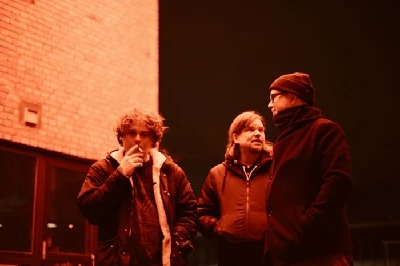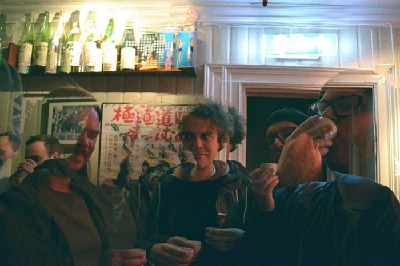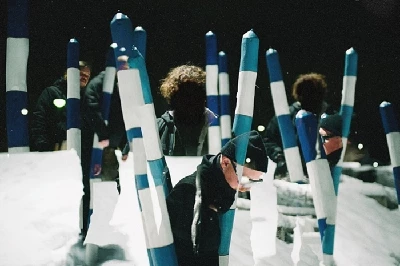published: 24 /
12 /
2019

Ben Howarth speaks to Mads Baklien, vocalist, guitarist and synth player of new Norwegian group Spielbergs, about their latest EP, the surprise at being on tour, and what years in bands has taught them about surviving as a group.
Article
Spielbergs first came to my attention shortly before the release of their first album (which arrived on 1st February this year). Reviews of the record online suggested they had something of an early Idlewild about them, combined with the energy of Superchunk. A few plays of the preview track was all I needed to order 'This Is Not The End' – it has never been too far from my stereo since.
Mads Baklien (guitar, vocals, synth), Stian Brennskag (bass) and Christian Løvhaug (drums) initially started up in Oslo. It was mainly as a Friday-night off from their families – one of them freely admitted in an interview that their girlfriend forced them to start playing music again because they were too grumpy. Having played in several bands previously, they hadn't expected the new group ever to leave the Friday night rehearsal space.
Recorded with Tord Øverland Knudsen (The Wombats) and Marius Drogsås Hagen (Team Me), their album takes you on a guided tour of indie rock – from the frenetic punk-pop of 'Five On It' and 'Bad Friend' to the epic, irreverent post-rocker, 'McDonald's (Please Don't Fuck Up My Order)'.
I missed their first visit to the UK, shortly after the album's release, but made up for it on a recent second run of dates. They were touring in advance of the release of a follow-up five-track EP, 'Running All The Way Home'. The EP combined songs recorded alongside the first album with new songs recorded over the summer. The live show was testament to the unshakable energy in their songs, but also showcased their knack of writing memorable tunes and the depth to their arrangements.
Shortly before that tour began, I spoke to Mads Baklien, who was battling a bad cold, but still took the time to tell me about his band's first album and their plans for the future.
Pennyblackmusic: So, to start, tell me about the background of the band and how you all got together.
Mads Baklien: Well, we had all been in bands before, in our twenties, ten years or so ago. For different reasons, we all had stopped playing. I was ready to have kids with my girlfriend, and I had started my education at Oslo College to be a Librarian. I think with the other guys; they were just tired of it.
So I had my job as a librarian, and I was working for a couple of years, and I started getting restless, and I had been writing songs all along… that's just something I do. I talked to Christian on the drums, and he was feeling restless too, so we started hanging out. We got this small rehearsal space in this warehouse building, and we started meeting up every Friday night, having beers and just jamming on some experimental stuff. It was just ideas, no big goals or ambitions, no anything – just having fun with it.
Then we met up with Stian, on the bass guitar. He's an old friend of mine; I grew up with him. We just asked if would be interested in joining us, just for a couple of Fridays. He did, and then suddenly we just started making a lot of songs – and finishing up songs. Stian, when he joined, was like the missing piece of the puzzle.
Then we got a record deal, with a small Norwegian indie label, and we just released a couple of singles. That led us to get a gig at a Norweigian showcase festival, in Trondheim. It was at that gig where we had the pleasure of meeting James Parish and Jay Taylor from Prescription PR.
Everything from there was just one thing after another. At first, Prescription wanted to do PR for us, and they helped us shop around for labels for our first LP. After a few months, we'd been sending our demos over to James and Jay, and they asked, what if we start a label and we release it ourselves. We said 'wow', that was perfect for us, and we just went from there.
PB: At that point, did you have the album finished and ready to go, or was there more recording?
MB: Mostly, the record was already done. We recorded a couple of songs right before we had to submit it, but at that point, we'd finished 90% of the songs.
PB: You released an EP first, 'Distant Sky', in 2018 – was that from the same group of songs, or separate?
MB: Well, the singles I mentioned, they came out on the Norweigian label first. When James and Jay set up the label, they wanted to introduce us with a smaller release first, so they just re-released the singles as an EP, so that's the story behind that. Some of the songs were also from the album sessions; we recorded the first tracks with the same guys in the same studio.
PB: So fans who've enjoyed the album don't need to try and track down the earlier singles then…
MB: I think maybe there is one song from the singles that have escaped everything, so it's entirely off the grid now. But we will see about that one in the future.
PB: Going back to the writing off the record, you mentioned that you had written longs of songs in the time when you weren't in a band… have any of those survived, and you now play with Spielbergs, or are most of the songs written since you all started getting together on Fridays?
MB: It's both. The very first song we finished as a band, and the first one we recorded, was 'We Are All Going To Die', which was the song that made James and Jay fall in love with us in the first place, I think. A lot of the stuff I had written in this in-between period were eventually the first songs for our band. I still have a lot of old songs left that we still have not done anything with, because I keep writing a lot of songs.
It will be really exciting when we start figuring out what we will be on the next album because we have A LOT of songs.
PB: There is a quite a big journey that you take the listener on with your first album. The first few songs are all broadly in the indie-rock category, then you change direction several times, with a long, almost post-rock song and then an acoustic track, like an Elliott Smith song. Do you think you'll continue to do this – or do you see yourselves maybe focussing more on a particular style in the future?
MB: The mantra of the band – right from the start – has been that we want to make whatever kind of songs, as long as they are good songs. We don't want to have a genre or feel like we have to make a particular kind of song.
To explain it, it's like we have two types of songs – we have songs that we see as pop songs, and for those, the song has what the song needs. There is a verse and a chorus, and we bang it out. And then we have these other kinds of songs, where we have to jam through them and figure out different solutions to different problems. Both of these two types of songs are important to us. We work in these different ways with the songs because I think the pop songs get better by us being more experimental with other types of songs. We build ourselves as a band; we develop our identity, I think. So, I can say that for LP two, we have no plan – we won't aim for pop or aim for this or that, we will have to make a lot of songs and figure out the best kind of album we can make.
PB: When you were writing, were there periods where did you did lots of jamming and then switched to doing lots of pop songs – or were you mixing it up every time you met up?
MD: Well, when you had songs like 'Ghost Boy' or the 'McDonalds' song, we usually kind of hit the wall at some point, where we couldn't get any further with it. So we'd then usually start on a new song, make a few more straightforward songs, and then a few weeks later we would try again. Maybe it would go better, or sometimes worse.
PB: Going back to what you said at the beginning, that you had all been in bands in your twenties. This band is your second go at it, in a way. Are there any things that you deliberately did differently this time from what you did before? Are you running the band differently?
MD: For me, I can speak for myself, the main difference is that I am not worried anymore if people are going to like my songs – now, I want to make a song. If I think it is good, I will bring it to the other guys. If we all like it, we'll take it further – I feel more confident in my songwriting now than I did when I was in my twenties.
In terms of how the band is being run, I am not worrying about that. Other people are doing that now – luckily, for the band and myself (laughs).
I think we are just doing the things we want to do right now, and they seem to be working.
I don't know, when I was in my younger years, I was playing in this post-hardcore band, which was also my project, as I was the primary songwriter. But I was much more interested in making something advanced. I wanted it to be really intelligent and smart. I don't think like that anymore – now, if it's three chords and a pop melody, that's great for me.
PB: The other question I had was what your expectations were when you were making the record, and when you met the guys who ended up being your label. You've mentioned you have kids and clearly can't spend all your time on the band, but you have now visited the UK twice this year and I think you are touring Europe later in the year. Has the amount time you've spent on the band come as a bit of a shock?
MB: I think it started to dawn on me about this time of year last year, maybe. But before that, it was kind of unthinkable. I had been quite sceptical of the talk of going out on tour, mainly because I did that a lot when I was younger and I was exhausted by that idea. But, now, that we are in it. We had this one week tour in Britain in February, and I was anxious about that little trip. When we got through that, it opened up a bit, and now I am looking forward, actually, to the rest.
PB: When you signed up for that initial run back in February, were you committed to doing more touring? Or was it a case of doing one run and seeing how it went?
MB: I think it's been worked out, as we have gone along. I think some later dates were already in place, but maybe not all of them. We have this close and good little team of people setting up dates, and I try to let everybody contribute as much as they want to. So if we get an offer of a gig in, say, six months, I will not say no to that – I will say, fantastic, I'll go and play.
PB: For anyone reading this who has heard the record, but hasn't seen you live, what should they expect from the live show? There are lots of effects and multi-layered guitars and keyboards. How does that come across for you on the live show?
MB: We are more aggressive, in a kind of way, when we play live. All of us have been playing punk, post-punk, post-hardcore and all these types of genres before. But we are trying to play both the pop songs and the jammier songs, and we have an extra guy on the synthesiser playing with us, who will put down some strange sounds, hopefully.
PB: Was he involved in the recording of the album – or is he just an extra for the live shows?
MB: No, actually, he was not on the album. But he is one of the main guys in the first label that signed us in Norway, so he has come along for the ride with us, he's become a touring member, so he's a perfect solution right now. Maybe he will contribute to the recording sessions in the future, that will be cool.
PB: So, is it fair to say that the plans for the second album are still at a relatively early stage – you wouldn't yet have a fully-formed idea of what it would sound like?
MB: Yes, I think you can say that. I may have all the songs for it ready already, but we don't know what it will sound like exactly, we will need to work it through. And now we will not be able to work on it until we finish with this tour.
PB: Are you the sort of band that would play around with the songs once you start recording them?
MB: Um.. this is a question about money. Because if we had the money to do that, to live in a studio for a couple of months, that would be fantastic, but that isn't the reality. So probably all the songs will be made in the rehearsal space, first, and then we can hopefully make some demos and then we will go into the studio.
PB: The other thing I wanted to ask about is the new EP – are they all new songs or are they leftovers from the sessions for the album?
MB: Some are what you would probably call leftovers, there were two songs that, when we were mixing, we didn't think fit in with the rest of the songs on the album. But, now we have remixed them, added some overdubs, and tried to freshen them up. We also have two brand new songs, recorded in the summer, which will also be on the EP and now we also have one other song, which we were supposed to record for the album and didn't have time to do. We were in England last year, and we recorded this one song in a studio in Cambridge, and since we have added some extra bits since.
PB: And then the vinyl lovers can also get the tracks from the first EP that weren't on the first album, as well…
MB: Yes, that's correct.
PB: Thank you.
Band Links:-
https://www.facebook.com/spielbergs/
https://twitter.com/spielbergsband
https://bythetimeitgetsdark.bandcamp.c
Play in YouTube:-
Picture Gallery:-

